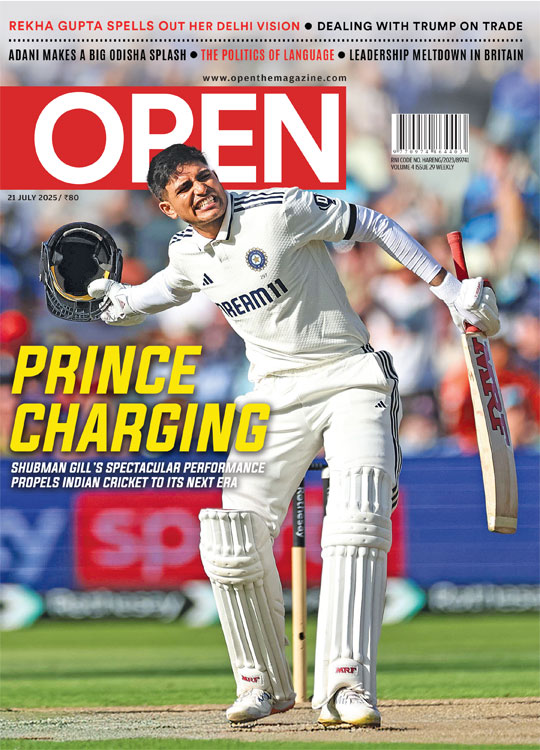The Uses of the Erotic
Saving sensuality in the age of techno-porn
 Amrita Narayanan
Amrita Narayanan
 Amrita Narayanan
|
21 Dec, 2017
Amrita Narayanan
|
21 Dec, 2017
/wp-content/uploads/2017/12/Erotic1_0.jpg)
ON THE PAGES of the Brave New World, Aldous Huxley offers us one version of a ‘normal’ sexuality of the future. Here, normal is a raw sexuality defined by the motto everyone belongs to everyone else. Babies are made in a hatchery and human sex is free from both reproduction and romance. Sexuality is encouraged from childhood, but romance and monogamy are considered socially destablising and are strictly disapproved of. Conventionality in Huxley’s Brave New World is defined by a deadly serious attitude to sex where sex must be had as much as possible, must never be in shortage, but attachment is considered odd. Along with romance and monogamy, despair is also taboo: people are invited to medicate themselves with the drug soma, that is freely doled out to everyone in gram units and keeps difficult emotions at bay, a gram is better than a damn.
Within this Brave New World there is an outlier, Bernard Marx, whose characteristic melancholy and unwillingness to constantly dismiss his moods with soma make him the cynosure of suspicious curiosity. One of the reasons Bernard is an outlier in the Brave New World is that he wants a conversation before sex. Lenina, the woman he asks this of, is appalled by his request, confused at his wish to delay the immediacy of sexual intercourse in order to share inner worlds and thoughts. Not only is Lenina alarmed by Bernard’s wish to delay sex—what on earth would they do in the meantime—she is also injured by it, wondering later if is she is not attractive enough, too plump. Under pressure Bernard gives in to sex without conversation, but afterwards says regretfully that he wished it had not ended with them going to bed right away. He speaks of his wish to be free from the urgency of sex, to know despair and to share another’s despair, to be free to know each other without the use of soma. Lenina is astonished by this incomprehensible and dangerous nonsense, so odd. In her response, we have a sentence that is interesting to think about in our 2017 world: “Never put off till tomorrow the fun you can have today,” Lenina said, gravely.
Bernard’s wish, to have a sexual life that includes the inner worlds of both persons, to deploy language, in the form of conversation, to share those worlds, is one way of distinguishing pornographic from erotic material. The dictionary definition of erotica and pornography vary in a slight but important way; erotica is defined as ‘relating to or tending to sexual desire’ while pornography is ‘the use of explicit and graphic material to stimulate sexual desire’. The words ‘relating to’ and ‘tending to’ are the important distinguishing factors between how one might categorise erotica and pornography. Erotica tries to create a relationship, an entry point into a world of sexual desire; it excites sexual desire and speaks about people’s journey within that excitation. Pornography stimulates a direct and immediate discharge of sexual desire. In Huxley’s Brave New World, pornography is encouraged, people of both genders are encouraged to treat each other like meat, and the wish for conversation within that sexual desire, along with the wish to explore desire rather than immediately gratifying it, is considered, as Lenina says, odd.
Within a contemporary ethos in which availability rather than scarcity of sexual material and indeed of sexual partners seems to be the norm, we have the opportunity to refine the distinction between pornography and erotica. Of the many ways to approach this distinction, one is to consider the two as aesthetic and literary styles. As a literary and aesthetic style, erotica is more aspirational than pornography. Erotica’s field of attention is more wide-ranging, lavish and encompassing, attempting to convey vastness, narrative-depth and subjectivity, the importance of individual stories. India’s oldest didactic erotic text, the Kama Sutra, declares its aspiration to erotic vastness at the outset, by setting the art of sex within the 64 arts—the kalas— that range from archery to soup-making. Sensually also the Kama Sutra aspires towards vastness, suggesting unctuous and aphrodisiac foods for the mouth, perfume for the nose, music for the ears, along with strategies to get rid of or keep husbands, girlfriends and wives.
Pornography is bereft of such an expansive context, because its goal is to discharge desire: the subject matter of porn is more focused in its attention. Both in its literary and film forms, porn tends to short-cut towards the goal of orgasm: other than their lusts, we know very little about the feelings of the actors in a porn film or story; the focus on enormous breasts, rapidly penetrating penises and yells of apparent pleasure insistently direct the viewer towards a superficial physicality that insists upon immediate sensation satisfaction. If we consider porn in a literary light: we notice immediately that plot lines are comparatively short, character development minimal, geography unimportant (that is, porn is often without a sense of place). The search for porn is often a search for a pre-planned fantasy that porn users would like to see enacted by others (hence the critique of porn that it objectifies the body whereas erotica subjectifies sex and makes it more interesting). Regular users of porn deploy plot-search terms that could be thought of as brief, more controlling and less wide- ranging than those who are interested in erotica. Erotica readers are perhaps more interested in the nuances of sexual desire and more willing to surrender to a wide-ranging narrative rather than looking for a particular fantasy enactment.
The promise of pornographic technology and consumer culture appeals to one of our most primitive of wishes, the idea of never being in need again, of always being satisfied
Another distinguishing literary feature of erotica from porn is that each medium has a very different position on waiting, the landscape of waiting, and on dependence on a specific person. Well- written or filmed erotica imaginatively uses visuals and language to enhance the possibilities of waiting for a lover. It imaginatively uses visual language to colour the landscape with the gloss of the erotic in order to make the wait imbued with sensual desire.
Consider a verse from a Tamil Sangam poem translated by AK Ramanujan:
The bare root of the bean is pink like the leg of a jungle hen,
And herds of deer attack its overripe pods.
For the harshness of this season of morning dew there is no cure
but the breast of my man.
By contrast the narrow ranging lens of pornography does not have time for the environment or for waiting; its purpose seems to be to spare us the painfulness of waiting for a specific person. The promise of individual use pornography is that the internet or the video will satisfy you wherever and whenever you like, you are no longer dependent on another human being’s vagaries. Pornography uses words that address our impatiences— fuck, breast, hard-penis—urging us to satisfy them rapidly. Implicit here is you can have penises rock hard and breasts enormous without the burden of hearing about the other person’s trials or sorrows, or the annoyance of hearing them snore after love-making.
While porn relieves the user the burden of subjectivity by highlighting objective sexuality, erotic literature is known for increasing subjectivity, plumbing memory to revive a transcendent quality of sexuality. Contrast the shut-your-laptop post masturbation reflex of pornography with this memory of a lover shared by this woman in the erotic second century Maharashtrian Prakrit Gathasaptasati:
My bare legs flung apart after love
How could I forget him?
Tasting each crease in my
body as the climax
subsided.
Conversation, waiting, the landscape of that waiting, and the memory of the whole person outside and inside, comprise the wide-ranging lens of the erotic. These come together to depict the beloved as a full person, whose insides are loved as much as the outsides, and to whom the lover surrenders. Consider this excerpt from the 17th-century writer Muddupalani translated from Telugu by Sandhya Mulchandani with its nostalgic embrace of the whole person:
Artfully she alternates,
Fuming and forgiving
Pleading and cajoling
Respecting and teasing
Adept of making love
She rules over me.
Her breasts heave,
Her hair spills over,
Sighs turn to groans,
Sweat runs
I remember
Our satiating intercourse
In the very depths of my mind.
While Muddupalani does not hesitate to describe breasts, yonis and penises, she also describes emotions including anger, grief, mourning and forgiveness, within the context of lovemaking between two beautiful bodies. Reading her Radhika Santawanam offers a profound experience of the extent to which erotic literature encompasses the whole person, inside and outside. It’s a theme reflected in almost all the major Indian erotic texts, from the Tamil Sangam and the Gathasaptasati, to the Amarusataka, the writings of Kalidasa or Bhartrihari: erotica emphasises the surrender of the lover to the whole being of the beloved.
Since literary styles invariably relate to styles of being, erotica and pornography could also be described by the styles of being that they represent. If you embrace a style of being that includes slow pace, long-form narrative, wide-ranging sensuality, inner worlds as well as outer worlds, and the pleasures of waiting for something, you might be on the erotica side. If you are aware of the pressures of time, keen to seek satisfaction immediately, have a good idea of what will satisfy you ahead of time, keen on independence from emotions, you might be more on the pornographic end of the spectrum. In the spirit of heterogeneity we might value both and not judge one style of being over another (although clearly as individuals each of us would have preferences). We might also consider that both styles of being might be present in one human being at different moments in time and in different ways.
ALONG WITH Never put off till tomorrow the fun you can have today, another mantra in Brave New World is the one against attachment and one-to-one romantic configurations: Everyone belongs to everyone. Romantic attachment and waiting for one individual person on whom one is fixated, is discouraged as being transgressive of the social order. Almost as a corollary, being alone with your own thoughts, the state of solitude, is discouraged: what makes Bernard odd is that he spends time alone with his own thoughts.
As a literary and aesthetic style, erotica is more aspirational than pornography. Erotica’s field of attention is more lavish, attempting to convey the importance of individual stories
It is an injunction that has a strange resonance with our contemporary world where the possibility of satisfying desire (for both information and sex) are literally at one’s fingertips, making more elusive the possibility of being alone with one’s thoughts. Why it might be worth something to delay the satisfaction of desire—whether for sex or for information—is increasingly unclear. Democratically available sex and information via the internet and electronic media platforms such as Snapchat, Tinder, Grinder and WhatsApp, run in sharp contrast to the erotic and knowledge- based aesthetics of pre-modern India that valourised the delay of gratification in both sex and knowledge. Students were required to learn shlokas whose meaning was only offered as an afterword, a reward to the persistent. In Sanskrit erotic literature, as poets and experts insisted, it was in the viraaha, the waiting, that longing—and eventually sexual pleasure— was amplified.
Plenty and availability via technology has ushered in new difficulties with solitude and waiting. For the promise of technology and consumer culture appeals to one of our most primitive of wishes, the idea of never being in need again, of always being satisfied. With its profusion of gratifications and instantaneous connections, pornographic technology dangles the promise that we never again have to be empty. The problem with the promise of constant satisfaction is that it tempts us into satisfying our excitements too quickly. Our negative capability, what Keats referred to as ‘when a (hu)man is capable of being in uncertainties, mysteries, doubts, without any irritable reaching after fact and reason’, is severely disrupted as we constantly google our way into certainty.
In a scenario where solitude, negative capability and waiting are hard to come by, the temptation to the fast-food of pornography is perhaps greater but the need for erotica is perhaps more. The rapid culture of Snapchat, in which visual image is more powerful than words, where impatience is rewarded immediately, and where the role of memory is diminished (the chats vanish shortly after they appear) tends more towards the style of pornography. The emphasis on visual stimulus, shortage of time, and the rapid satisfaction of excitements, appeals to a fantasy of being free of erotic despair. We find ourselves thus in a version of the Brave New World scenario where the wish for emotional ease and satisfaction causes people to steer clear of the two-person universe of the erotic, focusing instead on the satisfaction of physical lust in individual-oriented pornography or in sex, a la Lenina, that has no romance, attachment or conversation.
This is not to dismiss altogether the possibility of beneficial pornography. To distinguish problematic and unproblematic pornography, consider an example of a fulfilling experience of porn. An audience member at a recent erotica panel at which I spoke, raised the very lovely and important role that porn films had played for people in his parents’ generation, describing the example of a couple who periodically enjoyed watching porn within the context of a sexually and emotionally fulfilling relationship. This seemed to be a situation in which the common critique of porn, that it erases subjectivity and relationship, was less valid, because together the couple seemed to subjectivitise and make-relational the object (in that case the video-tape), imbuing it with meaning and shared experience. Another argument of when pornography might be potentially useful is as a practice for future real-world experience, meaning that first timers can use it to get sex-savvy. The problem with this argument is that as an introduction to sex, pornography’s focus on immediate satisfaction of the fastest available fantasy seems to lock the user into a limited, self-directed inner world, which makes reaching out to another—an essential aspect of non-virtual sex—increasingly difficult. The glut of technologically superior porn risks the pornographic, both as a literary—or film—style, and as a style of being, becoming a rigidity in character structure (or narrative structure) in which there is an addiction to one’s own fantasy, shutting out the other. An engagement with another can then become a performance and a forced enactment of a scenario in which the subject itself is missing, only an actor present. The problem of pornography is perhaps less the thing itself and more the tendency, caused by repeated use, to erase the subjectivity of the other, to limit the user’s own spontaneity and play, and a drying out of the imagination caused by an over focus on individual lust and personal plot lines, which in turn makes it difficult to have a vast, expansive, shared experience with another.
When technological interaction makes real-time experience difficult, erotic possibilities are of course limited. The characters in Brave New World avoided monogamy for the closed fortress that it makes of the couple, but the novel unveils another closed fortress, that of the individual self itself, one that has no capacity for solitude, melancholy or longing. A surfeit of relentless surfing, googling, WhatsApping and Snapchatting, threatens the contemporary capacity for solitude, and risks our ways of self-knowing. If we do not know ourselves, we are without the possibility of sharing our inner being with another; we can share our body but not our self, we can hurry into sex, but our capacity to wait for the other to slowly reveal their insides, or to reveal our own in conversation, may be diminished. When time is of the essence, waiting (for information or sex) makes us uneasy, and visual images threaten to overpower language, our capacity for erotic love becomes diminished. Our distracted times make less accessible those two critical last words in Gabriel Garcia Marquez’s suggestion: ‘Don’t let yourself die without knowing the wonder of fucking with love.’
For to look for solitude when there is always someone to meet on WhatsApp or Snapchat, to read erotica when pornography can rapidly meet our needs, is to reject ease in one sense, to become, like Bernard Marx in Brave New World, odd.

/wp-content/uploads/2025/07/Cover-Shubman-Gill-1.jpg)













More Columns
Shubhanshu Shukla Return Date Set For July 14 Open
Rhythm Streets Aditya Mani Jha
Mumbai’s Glazed Memories Shaikh Ayaz